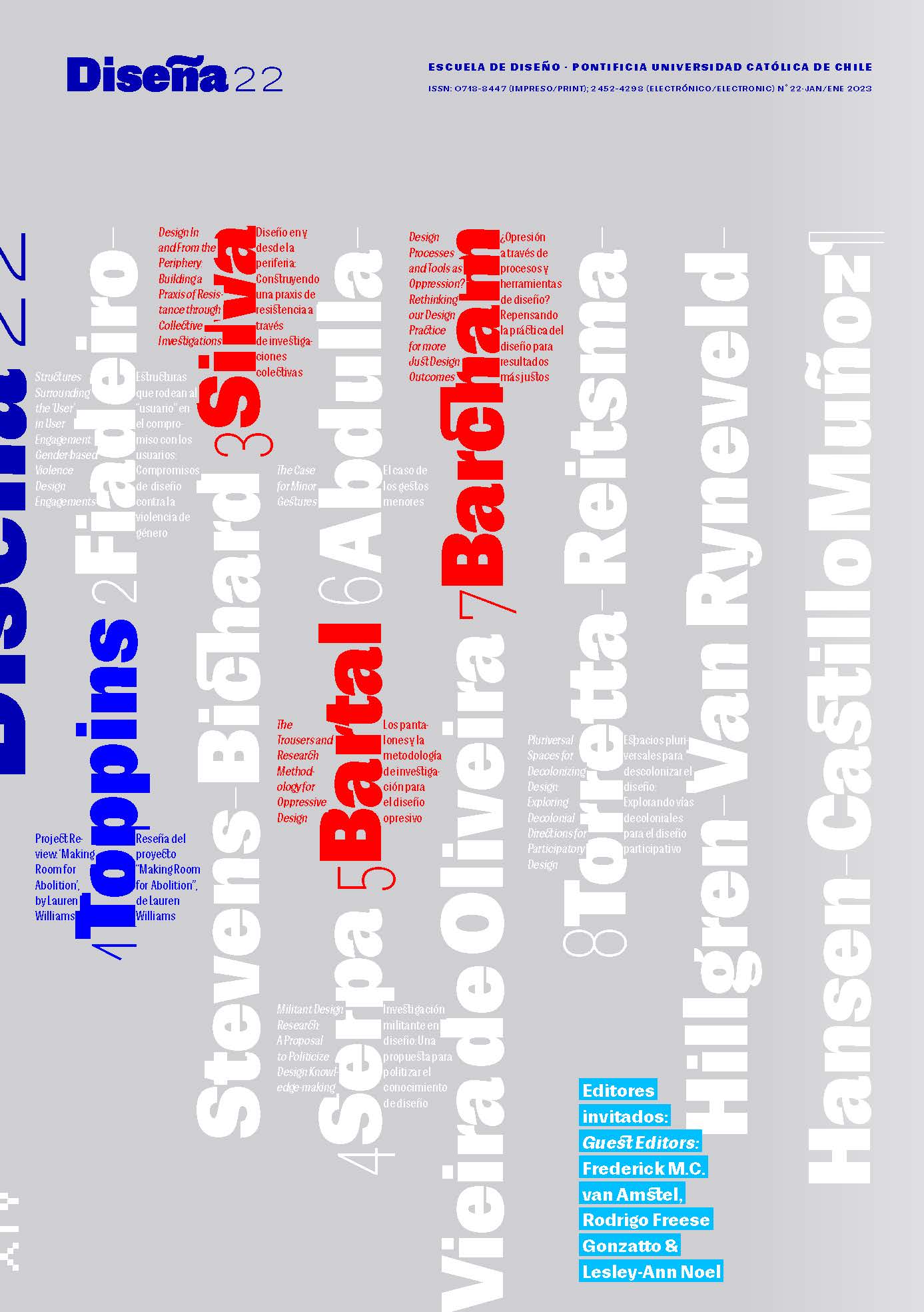The Case for Minor Gestures
Main Article Content
Abstract
This paper lays out the groundwork for a concept we define as minor gestures within design education. Moving away from a conversation centered around decolonization—a term, we argue, that has been co-opted to become a placeholder for equality, diversity, and inclusion, and tick-box exercises within academic institutions— we assert that minor gestures create the conditions for meaningful conversations on what it actually means to move towards decolonizing design education. Using examples from our own pedagogical practices, we sketch out and outline a proposition for minor gestures as theory-in-the-making, or an incomplete pathway towards meaningful, structural change.
Downloads
Article Details

This work is licensed under a Creative Commons Attribution-ShareAlike 4.0 International License.

This work is licensed under a Creative Commons Attribution-ShareAlike 4.0 International license.
COPYRIGHT NOTICE
All contents of this electronic edition are distributed under the Creative Commons license of "Attribution-ShareAlike 4.0 Internacional" (CC-BY-SA). Any total or partial reproduction of the material must mention its origin.
The rights of the published images belong to their authors, who grant to Diseña the license for its use. The management of the permits and the authorization of the publication of the images (or of any material) that contains copyright and its consequent rights of reproduction in this publication is the sole responsibility of the authors of the articles.
References
Abdulla, D. (2021). Disciplinary Disobedience: A Border-thinking Approach to Design. In C. Mareis & N. Paim (Eds.), Design Struggles: Intersecting Histories, Pedagogies, and Perspectives (pp. 227–241). Valiz.
Ahmed, S. (2010). Orientations Matter. In D. Coole & S. Frost (Eds.), New Materialisms: Ontology, Agency, and Politics (pp. 234–258). Duke University Press. https://doi.org/10.1215/9780822392996-011
Anzaldúa, G. (2015). Light in the Dark/Luz en lo Oscuro: Rewriting Identity, Spirituality, Reality (A. Keating, Ed.). Duke University Press.
Attfield, J. (1989). FORM/female FOLLOWS FUNCTION/male: Feminist Critiques of Design. In J. A. Walker, Design History and the History of Design (pp. 199–225). Pluto Press. https://doi.org/10.2307/j.ctt18mvngc.15
Dilnot, C. (2005). Ethics? Design? In S. Tigerman (Ed.), The Archeworks Papers, Volume 1, Number Two. Archeworks.
Giroux, H. A. (2013). The Disimagination Machine and the Pathologies of Power. Symploke, 21(1–2), 257–269.
Harney, S., & Moten, F. (2013). The Undercommons: Fugitive Planning & Black Study. Minor Compositions.
hooks, bell. (1994). Teaching to Transgress: Education as the Practice to Freedom. Routledge.
hooks, bell. (2000). All About Love. Harper Collins.
Irwin, T. (2015). Transition Design: A Proposal for a New Area of Design Practice, Study, and Research. Design and Culture, 7(2), 229–246. https://doi.org/10.1080/17547075.2015.1051829
Manning, E. (2016). The Minor Gesture. Duke University Press.
Mayorga, E., Leidecker, L., & Gutiérrez, D. O. de. (2019). Burn It Down: The Incommensurability of the University and Decolonization. Journal of Critical Thought and Praxis, 8(1), Article 1.
Mignolo, W. D. (2007). Delinking. Cultural Studies, 21(2–3), 449–514. https://doi.org/10.1080/09502380601162647
Noxolo, P. (2017). Decolonial Theory in a Time of the Re-colonisation of UK Research. Transactions of the Institute of British Geographers, 42(3), 342–344. https://doi.org/10.1111/tran.12202
Olson, G. A., & Worsham, L. (2007). The Politics of Possibility: Encountering the Radical Imagination. Routledge.
Rodríguez, C. O. (2018). Decolonizing Academia: Poverty, Oppression and Pain. Fernwood.
Said, E. W. (1994). Representations of the Intellectual: The 1993 Reith Lectures. Vintage.
Schultz, T., Abdulla, D., Ansari, A., Canlı, E., Keshavarz, M., Kiem, M., Martins, L. P. de O., & J.S. Vieira de Oliveira, P. (2018). What Is at Stake with Decolonizing Design? A Roundtable. Design and Culture, 10(1), 81–101. https://doi.org/10.1080/17547075.2018.1434368
Takriti, A. R. (2019, May 16). Decolonising the Study of Palestine 71 Years after the Nakba [Lecture]. Education, Occupation and Liberation Programme, London, UK. https://www.youtube.com/watch?v=Jppn7fuPbZ8

